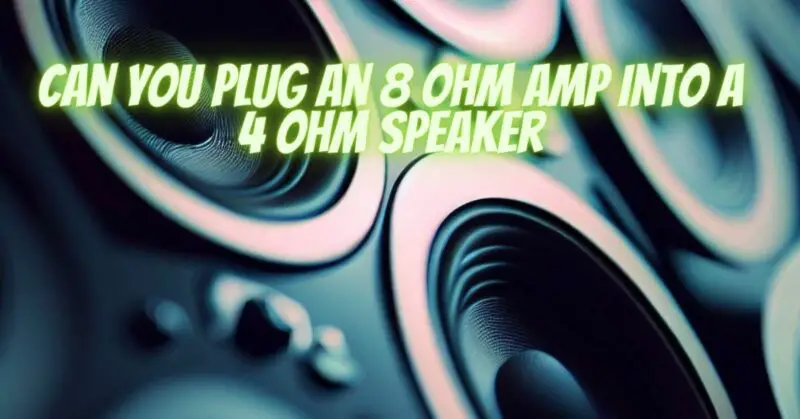The world of audio equipment is replete with intricate technicalities, and impedance matching is a critical consideration when connecting amplifiers and speakers. The question of whether you can plug an 8 ohm amplifier into a 4 ohm speaker is a common one, often arising when attempting to create a functional audio setup. In this article, we’ll delve into the complexities of impedance, exploring the implications, considerations, and potential risks of connecting an 8 ohm amplifier to a 4 ohm speaker.
Understanding Impedance Matching
Before addressing the connection of an 8 ohm amp to a 4 ohm speaker, let’s establish a foundational understanding of impedance matching. Impedance, measured in ohms (Ω), is the electrical resistance that a speaker presents to the flow of electrical current from the amplifier. Impedance matching ensures that power distribution is appropriate and prevents amplifier stress or potential damage.
Connecting an 8 Ohm Amp to a 4 Ohm Speaker
Let’s explore the factors associated with connecting an 8 ohm amplifier to a 4 ohm speaker:
- Power Distribution:
- 8 Ohm Amplifier: An 8 ohm amplifier is designed to deliver power to an 8 ohm load. When connected to a 4 ohm speaker, the amplifier will attempt to distribute more power than it’s optimized for, potentially straining the amplifier’s output stage.
- Impedance Mismatch:
- Impedance Ratio: The impedance ratio between the amplifier and speaker (8 ohms to 4 ohms) creates an imbalance in power distribution. This mismatch can result in increased heat generation and reduced amplifier stability.
- Amplifier Strain:
- Amplifier Stress: Connecting an 8 ohm amplifier to a 4 ohm speaker might cause the amplifier to work harder to drive the speaker, leading to higher current demand and increased risk of overheating.
- Potential Damage:
- Amplifier and Speaker: Prolonged use of an 8 ohm amplifier with a 4 ohm speaker can lead to amplifier and speaker damage, compromising both components’ longevity and performance.
Considerations and Risks
While it might seem tempting to mix an 8 ohm amplifier with a 4 ohm speaker, there are important considerations to keep in mind:
- Amplifier Tolerance: Some amplifiers are designed with a certain level of tolerance for impedance mismatches. However, repeatedly using an 8 ohm amp with a 4 ohm speaker can still strain the amplifier over time.
- Longevity and Performance: Both the amplifier and the speaker can be compromised when used in a mismatched setup. Over time, the strain can lead to reduced performance and potentially costly repairs.
- Speaker and Amplifier Protection: Impedance mismatches can void warranties on both the amplifier and the speaker, leaving you responsible for any repair costs.
- Sound Quality: Even if the setup works initially, the mismatch can result in suboptimal sound quality and inaccurate frequency response.
The question of whether you can plug an 8 ohm amplifier into a 4 ohm speaker is not just about whether it’s physically possible, but about whether it’s advisable and safe for your audio equipment. While some amplifiers might tolerate small impedance mismatches, it’s generally recommended to use equipment that matches impedance specifications. Protecting the longevity and performance of your amplifier and speaker should be a top priority. Instead of risking damage and subpar sound quality, opt for a setup where both the amplifier and speaker have compatible impedance ratings, ensuring a harmonious and safe audio experience that resonates with clarity and stability.


